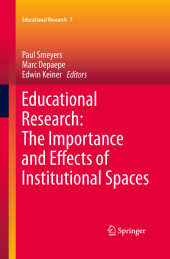 Neuerscheinungen 2015Stand: 2020-02-01 |
Schnellsuche
ISBN/Stichwort/Autor
|
Herderstraße 10
10625 Berlin
Tel.: 030 315 714 16
Fax 030 315 714 14
info@buchspektrum.de |

Marc Depaepe, Edwin Keiner, Paul Smeyers
(Beteiligte)
Educational Research: The Importance and Effects of Institutional Spaces
Herausgegeben von Smeyers, Paul; Depaepe, Marc; Keiner, Edwin
2013. 2015. viii, 221 S. 235 mm
Verlag/Jahr: SPRINGER NETHERLANDS; SPRINGER 2015
ISBN: 9400794347 (9400794347)
Neue ISBN: 978-9400794344 (9789400794344)
Preis und Lieferzeit: Bitte klicken
This book maps links between educational theory and research, and the geographical and physical spaces in which teaching is practiced. Traces the effects of ´space´ on educational practice in the classroom, in institutions, and in the discipline of education.
This collection of fresh analyses aims to map the links between educational theory and research, and the geographical and physical spaces in which teaching is practiced and discussed. The authors combine historical and philosophical perspectives in examining the differing institutional loci of education research, and also assess the potential and the limitations of each. The contributors trace the effects of ´space´ on educational practice in the classroom, in the broader institutions, and in the academic discipline of education-doing so for a range of international contexts.
The chapters address various topics relating to the physical and geographical environment. How, for example, does geographical space shape researchers´ mental frameworks? How did the learning environments in which young children are taught today evolve? To what extent did parochialism shape America´s higher education system? How can our understanding of classroom practice be enhanced by concepts of space? The book acknowledges that texts themselves, as well as the research ´arena´, are ´spaces´ too, and notes the fascinating debate on the concept of space in the field of mathematics education. Indeed, as more and more students move online, the book analyses the rising importance of virtual spaces such as Web 2.0, which have major educational implications for researchers and students joining the innovative ´virtual´ universities of the future.
This publication, as well as the ones that are mentioned in the preliminary pages of this work, were realized by the Research Community (FWO Vlaanderen / Research Foundation Flanders, Belgium) Philosophy and History of the Discipline of Education: Faces and Spaces of Educational Research.
1. Exploring a multitude of spaces in education and educational research; Paul Smeyers and Marc Depaepe .- 2. American democracy and Harold D. Lasswell: Institutional spaces of ´failure´ and ´success´, present and past; Lynda Stone .- 3. The power of the parochial in shaping the American system of Higher Education; David Labaree .- 4. Crossing the Atlantic to gain knowledge in the field of psycho-pedagogy: The 1922 mission of Ovide Decroly and Raymond Buyse to the USA and the travel diary of the latter; Marc Depaepe, Lieven d´Hulst, Frank Simon .- 5. The emergence of institutional educational spaces for young children: In pursuit of more controllability of education and development as part of the long-term growth of educational space in history; Pauline Schreuder and Jeroen Dekker .- 6. A different training, a different practice. Infant care in Belgium in the interwar years in the city and in the countryside; Pieter Dhondt .- 7. Disability, rehabilitation & the Great War: Making space for silence in the History of Education; Pieter Verstraete .- 8. Interpretation: The space of text; Richard Smith .- 9. Exploring educational research as a multi-layered discursive space; Stijn Mus .- 10. The spaces of mathematics: Dynamic encounters between local and universal; Karen Fran‡ois, Kathleen Coessens, Jean Paul van Bendegem .- 11. The classroom space: A problem or a mystery?; Ian Munday .- 12. Spaces and places in the virtual university; Nicholas C. Burbules .- 13. Material contexts and creation of meaning in virtual places: Web 2.0 as a space of educational research; Lynn Fendler and Karin Priem . 14. From entrepreneurialism to innovation: Research, critique, and the Innovation Union; Naomi Hodgson .- 15. About the Authors.- Index. _


